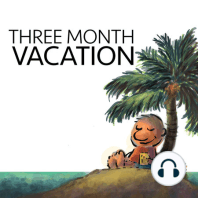1 min listen

How I Write 4000 Word Articles Without Getting Exhausted - Part One
How I Write 4000 Word Articles Without Getting Exhausted - Part One
ratings:
Length:
29 minutes
Released:
Sep 25, 2016
Format:
Podcast episode
Description
The biggest problem with article writing is the exhaustion factor It’s write, delete, write, delete and the endless cycle goes on. So how do you go about article writing? Can you really write articles and not get exhausted? In this series you get to see how I went from getting really frustrated, to writing 800 word articles and then 4000 word articles. What’s the secret to such an enormous output? And how do you do it without getting exhausted? ------------- In this episode Sean talks about Topic 1: Spacing out your article Topic 2: Is the timer an energy saver when writing articles? Topic 3: Why you should never research when writing the article Right click here and ‘save as’ to download this episode to your computer. ------------- When I was growing up in Mumbai, India, I thought pizza was sweet. No one I knew had ever eaten a pizza and all the references to pizza were from Archie Comics. Archie—and especially Jughead—always seemed to be eating a pizza. And for some reason, I associated pizza as a sort of candy, or sweet dish. Imagine my surprise when I ate pizza for the first time in my twenties. I sense a similar sense of surprise when I talk about how I write an article. Every time I talk about article writing, clients are usually taken aback. It’s almost as though they’re experiencing a disconnect between what they perceived to be true, and the reality. You may or may not know that I turn out about 3000-4000 words of fresh content every week. I do all this writing in between cooking and painting and everything else. So how do I write an article? Is it really a writing gene? Well, it can’t be a gene because I struggled like everyone else. I’d take two working days to write an article, back in 2000. Today I can complete an 800-word article in about 45 minutes. So what’s changed? Strangely it’s got not a lot to do with article writing itself, and a lot to with how I manage my energy. So what are we going to cover? Topic 1: Putting space between activities Topic 2: Using a timer Topic 3: Never research when writing the article Stage 1: Spacing out your article Here’s how I cook a meal. I get fresh vegetables and ingredients from Huckleberry—the organic grocery store up the road.Then I do nothing. Later that day, I’ll assemble the ingredients and then do a second bout of nothingness. Finally, when I’m ready to cook, several hours may have gone by. But cooking is quick, painless and the dish is incredibly tasty. What you’re reading about seems to be my method of cooking, but it’s not. It’s my method of conserving energy. To me, energy is what allows me to write so much. And the best way to expend energy is to do everything all together. The rookie writer will sit down, try to dream up the idea for the article, then try to write and get frustrated on a consistent basis. Instead, what you should do, is do as little as possible. So here’s how I go about my writing I’ll write down a topic, or if I’m, um, prolific, several topics. Then, before the idea slips away, I’ll write down three sub-topics. And in this article, the topic was about “How I Write” and the sub-topics were about: – Putting space between activities – Using a timer – Never research when writing the article Once that’s done I let my brain take a well-deserved rest It may seem like it’s important to keep the momentum going, but the best thing you can do when writing, is not to write anything at all. If you feel obliged to do so, maybe you can take those three topics and outline them. An outline will have a lot more detail because it’s the structure of the article and shows the flow. My outlines usually cover these main points. – What are we talking about? – Why is it so very important? – Other questions such as when/where etc? – Examples – Objections – Mistakes, if any – Summary – Close A week usually starts off with me writing one or many topics and sub-topics Then once I’ve let a day or two go by, I’ll write the outline. Another 24 hours will slide before I star
Released:
Sep 25, 2016
Format:
Podcast episode
Titles in the series (100)
Six Steps to Getting Amazing Response From Clients: What's the secret to getting results? Amazingly it's not some online marketing trick or strategy. It's just plain old follow up. But how do you follow up? And how can you have a marketing strategy—especially for your small business? In this episode... by The Three Month Vacation Podcast